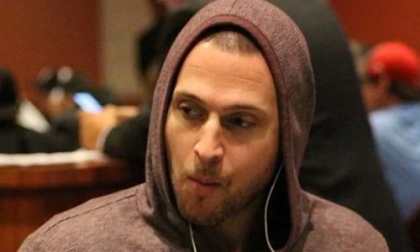Rich Alati’s Sensory Deprivation Prop Bet is Brain Melting
Would you be willing to live a nightmare for $100,000? While the “I work for Company XYZ… I already am,” is a great joke answer, I am talking about a literal living nightmare. Apparently, poker pro Rich Alati is, and I do not understand it at all. I also can’t fathom how he is halfway through it already. Alati, right now (as far as I know), is sitting in a pitch black, silent bathroom with no electronics, no communication with the outside world. He has been there since November 21st and – if he goes through the entire duration of the prop bet – will be in there for a total of 30 days. For $100,000. If he gives up, he must pay fellow poker pro Rory Young $100,000.
It’s insanity. Perhaps literally.
Poker players love their prop bets, but I don’t think I have ever heard of one this punishing, this sadistic. Go ahead and try to play 36 holes of golf in a couple hours. Lose a bunch of weight. Gain a bunch of weight. But near-sensory deprivation solitary confinement? Fuuuuck that.
Young explained to Pocket Fives that he was playing heads-up at the Bellagio with Alati, when to make conversation, he asked him how long he thought he “could last in a dark room, with no human interaction?”
The Prop Bet
Alati thought he could do it for 30 days and after some further discussion, they booked the $100,000 bet. They both escrowed $5,000 with a trusted third party and Alati had six months to begin. If either backed out, the other got the $5,000.
Young explained the setup:
The conditions are complete darkness, so no electronics, no light-emitting devices, no drugs of any kind. He is allowed any type of food that he wants. He has a bed in there, he has a shower and a bathtub. He has pretty lavish toiletries like Epsom salts, sugar scrubs, that kind of stuff.
He also has a refrigerator (interior light disabled) and receives periodic food deliveries. The deliveries consist of six days’ worth of food, but are delivered at irregular intervals so that Alati doesn’t get tipped off as to how much time has passed.
I was thinking about how the deliveries would work, as opening a door or a hatch would clearly let light in. My thought is that there is some sort of antechamber where the food is dropped off, serving as a buffer between the isolation room and the outside world. Perhaps someone deposits the food in the antechamber, knocks on Alati’s door, and then he waits a minute before opening his door to get the food. In the meantime, the deliverer has left and antechamber is pitch black.
Young said he was shocked at how quickly Alati accepted the bet, never even asking for odds, and how he did almost zero preparation for the experience.
There are five night-vision cameras recording Alati (he gets shower and toilet privacy), with a select group of family and friends able to watch. I would assume this is to ensure Alati’s safety and to make sure he is following the rules, but Young said they are hoping to sell the footage as a reality show down the road.
Thoughts and Prayers for Alati – These Things Don’t Go Well
Research has shown that severe isolation like this is a horrible idea and could result in serious mental trauma. Solitary confinement in prison is extremely controversial as many people think it is akin to torture, and the sensory deprivation and isolation there is not as extreme as in Alati’s case.
 An article in The Science Explorer describes the efforts of cave explorers Josie Laures and Antoine Senni were described, as they willingly spent three and four months, respectively, alone in separate dark caves to research the effects of such isolation in darkness. The way their brains lost all concept of time was nuts. Senni would sleep for 30 straight hours, but think he had taken a short nap. When he finally left the cave, he thought he was in there for two fewer months than he really was.
An article in The Science Explorer describes the efforts of cave explorers Josie Laures and Antoine Senni were described, as they willingly spent three and four months, respectively, alone in separate dark caves to research the effects of such isolation in darkness. The way their brains lost all concept of time was nuts. Senni would sleep for 30 straight hours, but think he had taken a short nap. When he finally left the cave, he thought he was in there for two fewer months than he really was.
The two were so lonely and out of sorts that they actually tried to capture rats for companionship. Laures was able to, Senni accidentally killed the one he tried to catch.
In another study, conducted a decade ago in the UK, six volunteers were isolated in a pitch black, silent rooms for just 48 hours. They experienced hallucinations, paranoia, panic, even knowing this was just an experiment with a limited duration.
One subject, a comedian whose normal extroversion made the experience increasingly rough, described looking at a non-existent pile of 500 oyster shells.
“I could see the pearly sheen on the oyster shells as clear as day,” he said.
“Then I felt as though the room was taking off from underneath me. For the first time, I realized that the lack of stimulation was driving me close to insanity. I felt nothing but numbness, as though I was losing the will to live.”
One of the researchers explained the hallucinations in a BBC documentary on the experiment:
In the dark room, people would be hallucinating because there is absolutely nothing to focus attention on. Now, in the absence of information, the human brain carries on working and processing information even if there’s no information to process. And after a while, it starts to create that information itself.
The subjects also saw their mental acuity decrease severely after only being isolated for two days. They performed much worse in cognitive tests after the experiment than they did beforehand.
That Rich Alati is somehow still in his dark room is amazing. Hopefully he won’t have to spend too much of the $100,000 on therapy if he makes it through.

















COMMENTS